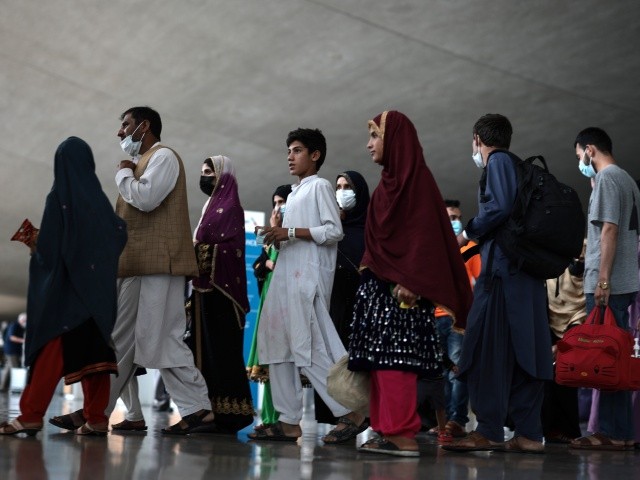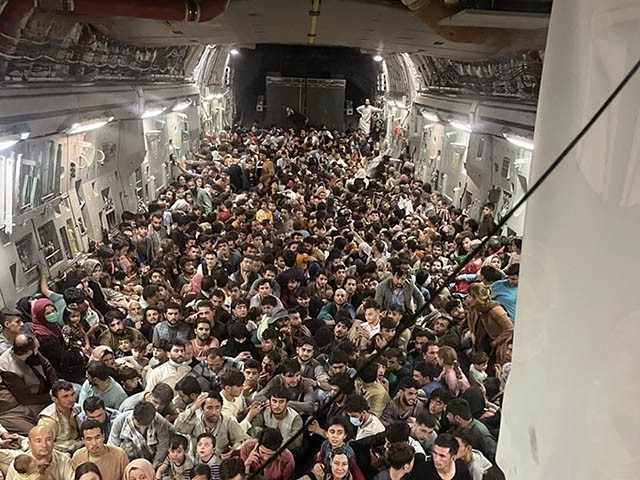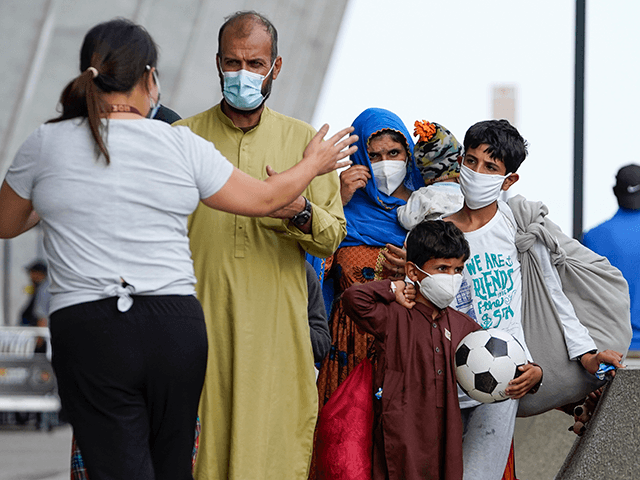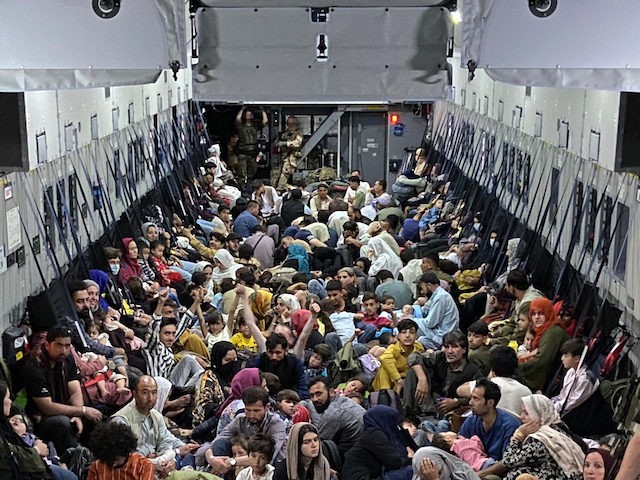Pro-migration groups want at least $8 billion in Americans’ money — and a new citizenship law — to help fast-track at least 50,000 mostly unvetted Afghan migrants, according to the Washington Post.
“The number we’ve been floating around, just on the back of the napkin, is $5 billion for [the Department of Health and Human Services], $2 billion for [the Department of] State, and $1 billion for [the Department of Homeland Security], at a minimum,” said Mark Hetfield, president of the Hebrew Immigrant Aid Society.
The advocates also told the Washington Post that they want the incoming Afghans to jump the line in the nation’s asylum courts. The line is several years long because Democrats have allowed at least two million Central American migrants into the United States since 2009 under the claim that they need asylum from crime and poverty. The Post reported:
Congress could create a mechanism to allow them to “adjust” to legal permanent residency, aid groups say, along the lines of the Cuban Adjustment Act of 1966 or more recent programs to aid Iraqis.
The [Afghan] parolees could apply for asylum, stating a fear of persecution if returned to Afghanistan, but the U.S. asylum system is badly overloaded by applicants from the Mexico border.
A survey by Rasmussen Reports shows that the public does not approve of the Democrats’ rush to naturalize tens of thousands of Afghans. A majority of Americans oppose the resettlement of more than 50,000 Afghans in the United States, according to an August 18-19 survey of 1,000 likely voters by Rasmussen.

Refugees walk through the departure terminal to a bus at Dulles International Airport after being evacuated from Kabul following the Taliban takeover of Afghanistan on August 31, 2021, in Dulles, Virginia. (Anna Moneymaker/Getty Images)
Many of the migrants could impose more chaotic diversity to Americans’ society, in part, because many are fundamentalist Muslims who lack passports.
Many pro-migration lobby groups are lavishly funded by wealthy pro-migration donors, including Mark Zuckerberg, George Soros, Brad Smith, the president of Microsoft, and others who hide their identity.
But the groups say they cannot get access to usual spigots of taxpayer cash because many Afghan migrants are being sneaked into the United States via small a side door in U.S. immigration law.
For example, only a few of the Afghans fought alongside the U.S. military, so only a few can get “Special Immigrant Visas” (SIV) created by Congress.
Also, only a few of the migrants were legally approved as refugees amid the rush by thousands of Afghans into American aircraft.

Afghan citizens pack inside a U.S. Air Force C-17 Globemaster III, as they are transported from Hamid Karzai International Airport in Afghanistan, August 15, 2021. The Taliban on Sunday swept into Kabul, the Afghan capital, after capturing most of Afghanistan. (Capt. Chris Herbert/U.S. Air Force via AP)
So most of the roughly 20,000 migrants now in the United States were allowed into the United States via the little-used “parole” side door in U.S. immigration law. The parole side door was intended for a few charitable cases such as sick passengers on an international flight, “on a case-by-case basis for urgent humanitarian reasons or significant public benefit,” according to federal law.
President Joe Biden’s border chief, Alejandro Mayorkas, may try to admit 50,000 Afghans via the parole door, Hetfield told the Washington Post.
The requested $8 billion in cash “would give [Afghan] parolees the same amount of assistance as refugees or SIVs would get,” Hetfield said.
The changed citizenship laws would allow the paroled Afghans to quickly win green cards and citizenship, many of whom lack vital identification documents or even endorsements by U.S. soldiers. That fast-track process could deliver tens of thousands from Afghanistan to the polling booths by 2028.

Afghan refugees arrive at Dulles International Airport in Northern Virginia while en route to military facilities in the U.S. (Jack Gruber-USA TODAY)
Meanwhile, many millions of Americans are unemployed, earn little money, and have difficulty paying their rents. Much of that economic distress is caused by the federal government’s policy of encouraging migration into the United States.
Overall, Biden’s government is expected to import 1.6 million migrants in 2021, or roughly one migrant for every two American births in the year. This policy extracts many new workers, consumers, and renters from poor countries for the benefit of U.S. employers, investors, and government agencies — and also to eventually deliver many potential voters to the Democratic party.
This policy of extraction migration damages ordinary Americans’ career opportunities, cuts their wages, and raises their housing costs.
More migration also means that coastal investors can hire cheap foreign labor on the coasts instead of investing in heartland jobs or deploying wage-boosting robots. Immigration also shrinks Americans’ political clout and wrecks their open-minded, equality-promoting civic culture.

COMMENTS
Please let us know if you're having issues with commenting.